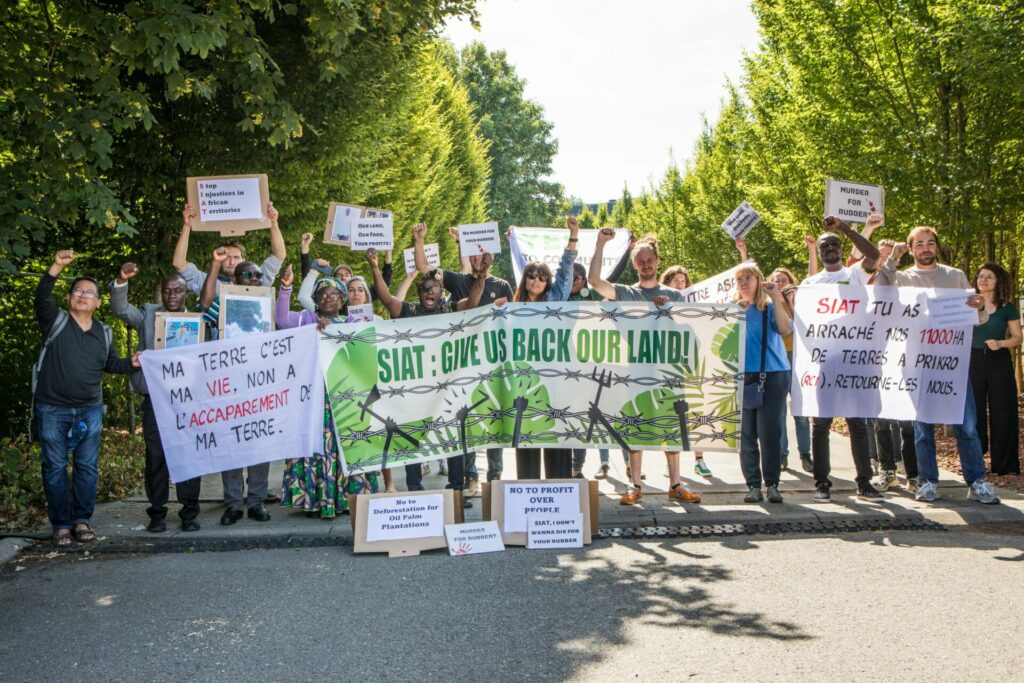Five representatives from three West African countries organised a protest against SIAT, a Belgian company that produces palm oil and rubber in Africa, accusing them of land-grabbing and damaging their environment.
The action, which took place at SIAT's headquarters in Sint-Stevens-Woluwe (a district of Zaventem), was attended by some 40 representatives from Nigeria, Ghana and Ivory Coast on Wednesday, as well as CIDSE, Entraide & Fraternité and CNCD-11.11.11. They carried banners with slogans like "SIAT, give us back our land" and "Stop Injustice in African Territories".
"We are suffering. Women cannot get food from the forest to feed their children," one person said during the protest.
🚨 NOW: A delegation of West African community leaders handed a letter with their demands to a SIAT representative 👇 pic.twitter.com/6ZJbauquE7
— CIDSE (@CIDSE) June 22, 2022
The consortium of communities has denounced what they say is land grabbing by the company and its violation of human rights.
Damage on various fronts
SIAT is one of the five main companies that control 75% of oil palm plantations on the African continent and sells palm oil products to large multinational corporations such as Unilever and Nestlé, while its rubber products feed into the supply chains of the international giants of the tyre industry, such as Michelin and Goodyear.
The group owns 46,100 hectares of oil palm plantations and 24,000 hectares of rubber plantations, however, part of those plantations might be on stolen land.
"The company acquired tens of thousands of hectares of land from local people through long-term concessions, depriving local farmers of food security. The mono-culture plantation of rubber and palm oil damage the environment and biodiversity," Kristel Cuvelier of Fian Belgium, an NGO which organised the action, said.
22/06: Action publique d'une délégation africaine contre les accaparements des terres de l'entreprise belge SIAT. #LandGrabbing #StopCorporateImpunity #LandJustice pic.twitter.com/SvYaqBUBPC
— FIAN Belgium (@FIANbelgium) June 22, 2022
Tweet translation: "Public action by an African delegation against the land grabs of the Belgian company SIAT."
The group is arguing that this expansion of land took place without SIAT ensuring the rights of local communities.
Although the contexts are different in each country, the claims of the Ghanaian, Ivorian and Nigerian communities are similar and include land grabbing in the form of threatening the food sovereignty of local communities, deforestation and environmental degradation, as well as workers’ rights violations and strong repression of local communities’ opposition to the company’s activities.
'Asked to take the land'
The delegation was visiting Belgium between 12 and 22 June, during which they also organised political meetings on the legislative debates on the duty of care for companies and met with the press. The aim was to "denounce a predatory agro-commodities model inspired by a neo-colonialist logic."
Related News
- 'In bad taste': Belgium asked to change name of Order of Leopold II
- Belgium's King Philippe returns rare mask to DR Congo
It has also published a new policy brief highlighting evidence of land grabbing by SIAT in Africa and has called for the adoption of strong binding rules for companies at the Belgian, European and international levels.
During the manifestation outside the company's headquarters, Fian Belgium handed over a letter with their demands to the management, which SIAT's CEO, Jan van Eykeren, confirmed that the company has received.
"We are going to look at everything carefully and then respond appropriately," he told Belga News Agency.
Van Eykeren emphasised that the company is not engaged in "land grabbing," adding that the land was acquired at the request of the various governments, at a time when state-owned companies had to privatise. We do not go looking for extra land, the governments ask us."

